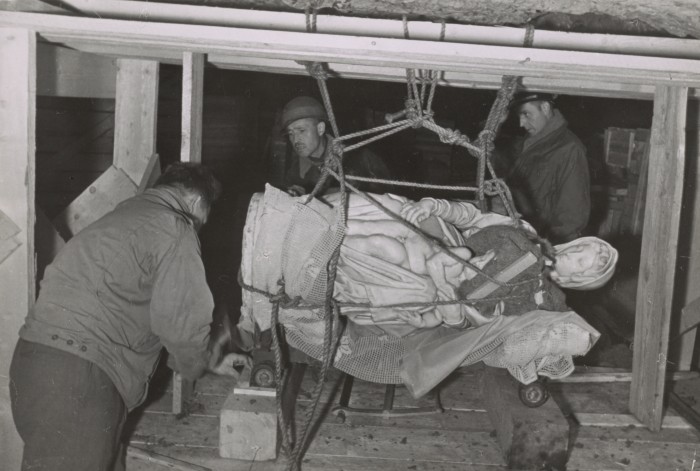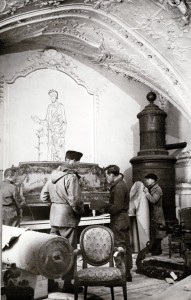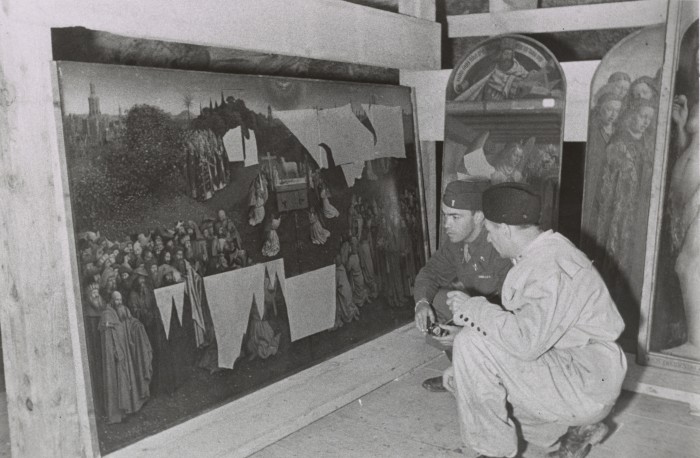Meet the real “Monuments Men”

Rescuing Michelangelo’s Madonna and Child, Altaussee, 1945.
Thomas Carr Howe papers, Archives of American Art, Smithsonian Institution
During World War II, an unlikely team of soldiers was charged with identifying and protecting European cultural sites, monuments and buildings from Allied bombing. Officially named the Monuments, Fine Arts and Archives Section, this U.S. Army unit included art curators, scholars, architects, librarians and archivists from the United States and Great Britain. The unit quickly became known as the Monuments Men. Towards the end of the war, their mission changed to one of locating works of art that had been looted by the Nazis. The Monuments Men recovered some of history’s greatest works of art hidden everywhere from castles to salt mines across Germany and Austria.

Rescuing art from Buxheim Monastery, Bavaria, 1945.
James J. Rorimer papers, Archives of American Art, Smithsonian Institution. Photo by Edward E. Adams
The Smithsonian’s Archives of American Art holds the personal papers and oral-history interviews of several key Monuments Men, including George Leslie Stout, James J. Rorimer, Walker Hancock and Thomas Carr Howe. The exhibition, “MONUMENTS MEN: On the Frontline to Save Europe’s Art, 1942-1946,” will present original photographs, official military records and letters that chronicle this extraordinary mission. The correspondence illuminates art conservator Stout’s efforts to establish a national wartime Conservation Corps and the challenges and hardships of working on the frontline of war. Historical records and photographs document the magnitude of the Nazi looting, including the collection of stolen artwork amassed by Nazi Germany’s second in command, Hermann Goering. The exhibition also documents the heroic efforts of Rorimer, one of the Monuments Men who located and removed France’s great art treasures from the magnificent Neuschwenstein Castle deep in the Bavarian Alps. Rorimer worked with Rose Valland, a French art curator who spied on the Nazis at great personal risk. Compelling photographs reveal how Monuments Men George Stout and others recovered treasures like Jan and Hubert van Eyck’s “Ghent Alterpiece” and Michelangelo’s famous Bruges sculpture “Madonna and Child” from the Altaussee salt mines in Austria.
The exhibition “Monuments Men” will be on display from Feb. 7 to April 20 in the Lawrence A. Fleischman Gallery at the Smithsonian’s Donald W. Reynolds Center for American Art and Portraiture. There also will be special gallery talks about the exhibition March 13 and 28 at 1 p.m.
About the Movie
These true stories of the greatest treasure hunt in history is the basis for new film The Monuments Men, an action drama focusing on seven over-the-hill, out-of-shape museum directors, artists, architects, curators and art historians who went to the front lines of World War II to rescue the world’s artistic masterpieces from Nazi thieves and return them to their rightful owners. From director George Clooney, the film stars Clooney, Matt Damon, Bill Murray, John Goodman, Jean Dujardin, Bob Balaban, Hugh Bonneville and Cate Blanchett.

Lt. Daniel J. Kern and German conservator Karl Sieber examining Jan van Eyck’s Adoration of the Mystic Lamb, also known as the Ghent Altarpiece (1432).
Thomas Carr Howe papers, Archives of American Art, Smithsonian Institution
Posted: 5 February 2014
-
Categories:
Archives of American Art , Art and Design , Collaboration , Feature Stories , History and Culture



